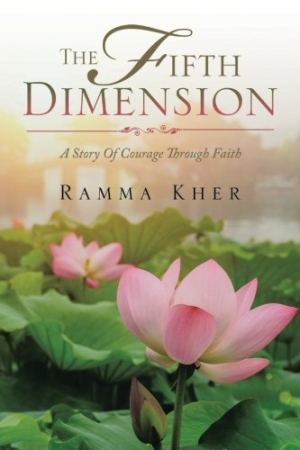The Fifth Dimension
A Story of Courage through Faith
The Fifth Dimension is a loquacious novel with some interesting philosophical insights.
Ramma Kher’s novel The Fifth Dimension follows a woman through grief, motherhood, and numerous existential crises.
After the devastating death of her young husband, Meera plans to move back to India from Canada. Before the move, another dear friend of hers dies, leaving Meera as the sole guardian of her infant son, Rishi. Over the next several years, Meera struggles with grief, interrogations from her friends and family, and finding her place as a widow and a single mother. Countless people move in and out of her story, challenging her in myriad ways.
The book’s language is flowery, obscuring meaning. It overrelies on adjectives that are strung together. Concepts are overexplained and lose their centers. Sentences read like they’re trying to deliver profound ideas, but they are imprecise—declaring, for example, that “With age, humans erect inane impediments between them and their inner selves; feelings lose their way in a maze of confounding rationalization invented to evade facing emotions dauntlessly.”
The book deviates from the central plot at regular intervals. Main characters are removed from the action to have in-depth philosophical discussions over tea or dinner—analyzing theories of the “primordial soup,” the origins of the Hindu religious texts, and Indian politics. It is unclear whether the book’s main aim is delivering these existential extrapolations or following Meera’s journey through grief to hope. Subplots featuring minor characters in Meera’s life (her friend’s son is shown struggling in the Canadian military in one instance among many) and verbose explanations of the historical backgrounds of India and Canada are additional distractions.
Sudden shifts between third person and second person narrations in the first section of the book—telling the story as if “you” are Meera—are jarring. The story flips back and forth in time and from one location to another without clear transitions.
The long book is divided into only five chapters, each about 100 pages long. There are few breaks, and the work is long-winded. However, each section hews to a particular emotional struggle of Meera’s—her husband’s death; the sudden move back to India with an infant; Rishi being bullied in school for being half white; and navigating a labyrinth of racism, gossip’s effect on reputation, spirituality, and the truth of Rishi’s paternity, respectively.
Though its innumerable characters are hard to keep track of, the novel’s central characters, Meera included, have lifelike personalities. Their stories are interesting to follow, especially in regard to cultural differences and political upheaval.
The Fifth Dimension is a loquacious novel with some interesting philosophical insights.
Reviewed by
Aimee Jodoin
Disclosure: This article is not an endorsement, but a review. The publisher of this book provided free copies of the book and paid a small fee to have their book reviewed by a professional reviewer. Foreword Reviews and Clarion Reviews make no guarantee that the publisher will receive a positive review. Foreword Magazine, Inc. is disclosing this in accordance with the Federal Trade Commission’s 16 CFR, Part 255.

